This book is for you, the reader.
May you never have to go on a diet again!
CONTENTS
 | Nutrition & eating habits |
 | Exercise & fitness habits |
 | Mindset & motivation |
Ive got some good news for you. If youre fed up with diets, clean eating, relentless fitness programmes and depriving yourself of your favourite treats, youve come to the right place. Your days of vegetable juice and superfood powders are over. Youll never need to take another fat-burner again, you wont have to re-mortgage to buy the latest detox kit, nor will you have to force yourself to eat only brown rice because thats what the magazine said
Im going to be the encouraging voice in your head, the parrot on your shoulder, your weight-loss coach in your pocket, and together were going to fight the fat so that this will be the last weight-loss book youll ever read.
Once youve finished with this book, not only will you feel motivated, inspired and lighter, but also...
Youll discover that individual foods are not to blame for weight gain and most nutrition advice is based on myths, hearsay, anecdotes and pseudoscience.
Youll be able to recognise and avoid unhealthy detoxing, cleansing, rebooting or any other popular, unsustainable fad diets and will not be fooled by their empty promises.
Youre going to learn 101 ways to lose weight, supported by scientific evidence, covering nutrition, exercise, sleep, goal-setting, mindset, food environment and willpower that will help you to get leaner, fitter, stronger and happier without the hunger and heartache.
But before we go any further, its important to understand the basic mechanisms behind how we lose weight.
There are two words that, when combined, create the foundation for weight loss: calorie deficit. If a calorie deficit doesnt exist, YOU WONT LOSE FAT. Quite simply, a calorie deficit is when you consume fewer calories than youre burning or youre burning more calories than you eat and drink per day. When this happens, your body starts to look somewhere else for fuel. Body fat is loaded with energy, so when youre in a calorie deficit, your body turns to fat for a fuel source. Body fat is burned and, ta-da! you lose fat, and weight, as a result.
 If youve ever lost weight, its because youve been in a calorie deficit.
If youve ever lost weight, its because youve been in a calorie deficit.
 If your weight isnt going down, its because youre burning roughly the same number of calories as youre eating.
If your weight isnt going down, its because youre burning roughly the same number of calories as youre eating.
If your weight is increasing, it means youre in a calorie surplus thats when youre consuming more calories than youre burning.
Most of the unpleasant diets you might have tried in the past have the same core tenet: they create a huge calorie deficit that involves you eating next to nothing or exercising for hours upon hours every day. Sure, you might lose a lot of fat in the beginning, but the diets are often so horrible and unsustainable that you only follow them for a few days and, in most cases, the weight just goes on again when youve finished.
But thats not going to happen this time.
Youre not going to do anything so extreme or unpleasant that you feel that you want to throw in the towel and go back to normal after a few days.
This book is full of ways and habits that youre going to practise not rules that you follow and that youll get better the more you do them. Most of them are going to help you to create a small calorie deficit (because thats more sustainable than anything drastic) by either reducing the calories you eat or by increasing the calories you burn.
But dont panic. Calories count, but you dont have to count calories.
Anyone who tells you that calories dont count should be ignored; you cant argue with physics. However, most of the habits were going to cover will move you into a calorie deficit without your having to weigh every gram and write down every morsel of food you eat. Yes, there are some habits that do focus on tracking and will require some logging on your part, but you dont have to pick those ones to follow if theyre not for you theyre just another tool that you might pick from the 101 tools in this box.
My suggestion is that you start off with 3 ways to adopt for the next 30 days. Pick the ones that you think are the most realistic, the ones youll easily be able to follow, the ones that sound the most fun and the most enjoyable. Each month youll tack some new ways onto the ones that are already in place. So, after 30 days youll add on another 3 ways to the ones youve already been practising, after another 30 days add on another 3, and so on.
Why only 3? Were setting the barrier low. My mate Karl uses a quote that I love: Its better to be consistently good, not occasionally perfect. There is nothing stopping you from trying to implement 10, 20 or even 30 ways all at once, but it would involve such a huge change to your current lifestyle, youd be likely to forget a lot of what youre applying. Also, because its so different from what you do normally, it wont be much fun.
Biting off more than you can chew, pun intended, often results in people becoming work-week dieters. As diets always start on Monday, they find that they are so good during the week that, come the weekend, their extreme restriction and bird-food diet causes a blowout and wipes out the calorie deficit created during the week. Sound familiar?
If you pick small habits to focus on every day, you will develop a level of consistency throughout the whole week, instead of your week being a mixture of extremes: perfect Monday to Friday, the weekend a disaster, only to repeat the cycle the following Monday. Consistency of effort is greater than intensity of effort, and its that consistency that will produce stunning results over time.
Before you get started, check out the hidden resources that accompany this book. Ive created a really helpful habit-tracking diary that you can download for free here: weightlossbook.co.uk/resources
Bear in mind that this is not a fitness manual, so I dont explain how to do every exercise I talk about. I want to help you develop tricks for manageable and long-lasting weight loss by showing you ways of approaching exercise and fitness (and nutrition, of course). So if you need guidance on how to use a kettlebell, or what a burpee is, check out the resources page mentioned above.
Diets are like boats: you go on them, you come off them. Theyre like books: you start, you finish, you go and do something else.

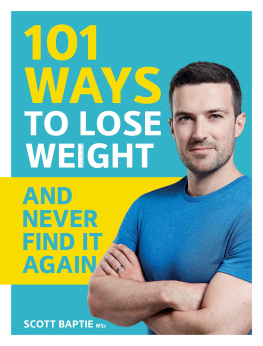
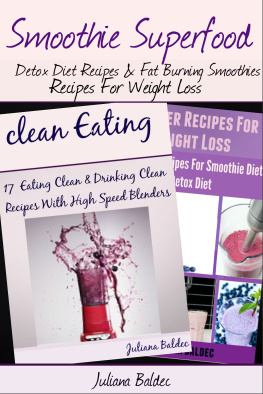
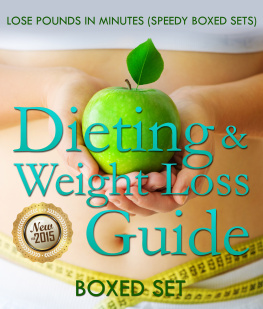
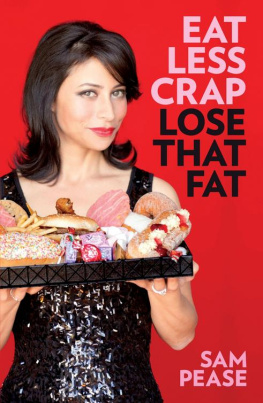


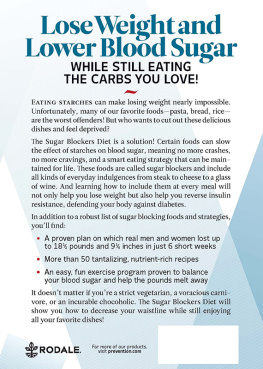
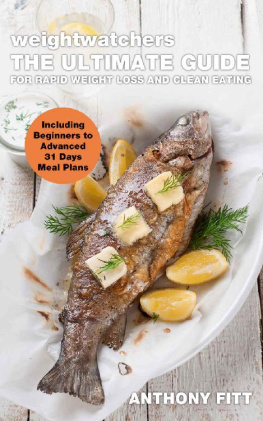
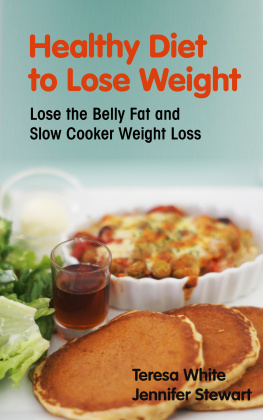







 If youve ever lost weight, its because youve been in a calorie deficit.
If youve ever lost weight, its because youve been in a calorie deficit.